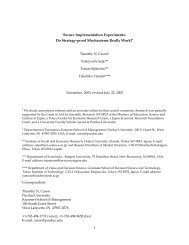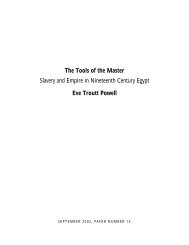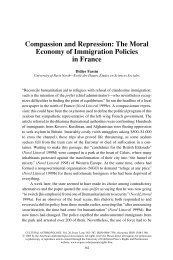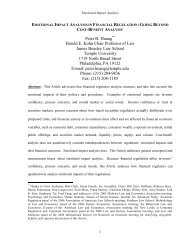Governance, Growth, and Development Decision-making - School of ...
Governance, Growth, and Development Decision-making - School of ...
Governance, Growth, and Development Decision-making - School of ...
Create successful ePaper yourself
Turn your PDF publications into a flip-book with our unique Google optimized e-Paper software.
nities. Best-practice institutions are, by definition, non-contextual<br />
<strong>and</strong> do not take account these complications. Ins<strong>of</strong>ar as they narrow<br />
rather than exp<strong>and</strong> the menu <strong>of</strong> institutional choices available to<br />
reformers, they serve the cause <strong>of</strong> governance badly.<br />
5. Trade<strong>of</strong>fs<br />
One benefit <strong>of</strong> <strong>making</strong> the distinction between governance-as-anend<br />
<strong>and</strong> governance-as-a-means is that it enables us to recognize<br />
trade<strong>of</strong>fs that may have otherwise escaped our attention. Consider<br />
again some illustrations.<br />
Suppose your growth economist identifies a poorly functioning<br />
legal system <strong>and</strong> the attendant uncertainty as one <strong>of</strong> the binding<br />
constraints on growth. One solution <strong>of</strong> the “governance-in-thesmall”<br />
type is to “outsource” part <strong>of</strong> the country legal system to the<br />
outside world. The government can accomplish this, for example, by<br />
signing on to bilateral investment treaties (BITs) with major trading<br />
partners. These typically have arbitration clauses that enable foreign<br />
investors to seek redress under foreign jurisdictions in a variety <strong>of</strong><br />
circumstances. One can presume that such clauses increase the<br />
comfort factor for foreign investors <strong>and</strong> that they may therefore help<br />
overcome the identified growth constraint. But is this strategy also<br />
good for governance-as-an-end? Probably not. Aside from creating<br />
an unhealthy distinction between domestic <strong>and</strong> foreign investors—the<br />
latter have the extra protection but the former don’t—such<br />
outsourcing <strong>of</strong> legal powers does nothing to strengthen domestic<br />
legal institutions. Ins<strong>of</strong>ar as it removes an important source <strong>of</strong> pressure<br />
for legal reform, the outsourcing may even delay the establishment<br />
<strong>of</strong> a healthy judiciary.<br />
A similar tension arises with many other forms <strong>of</strong> external or<br />
internal commitments aimed at enhancing the domestic investment<br />
environment: fiscal rules, central bank independence, tariff bindings<br />
at the WTO, regional trade agreements, IMF or World Bank conditionality.<br />
These are least problematic when they have their roots in<br />
the government’s desire to constrain its future behavior in view <strong>of</strong><br />
Dani Rodrik 23
















